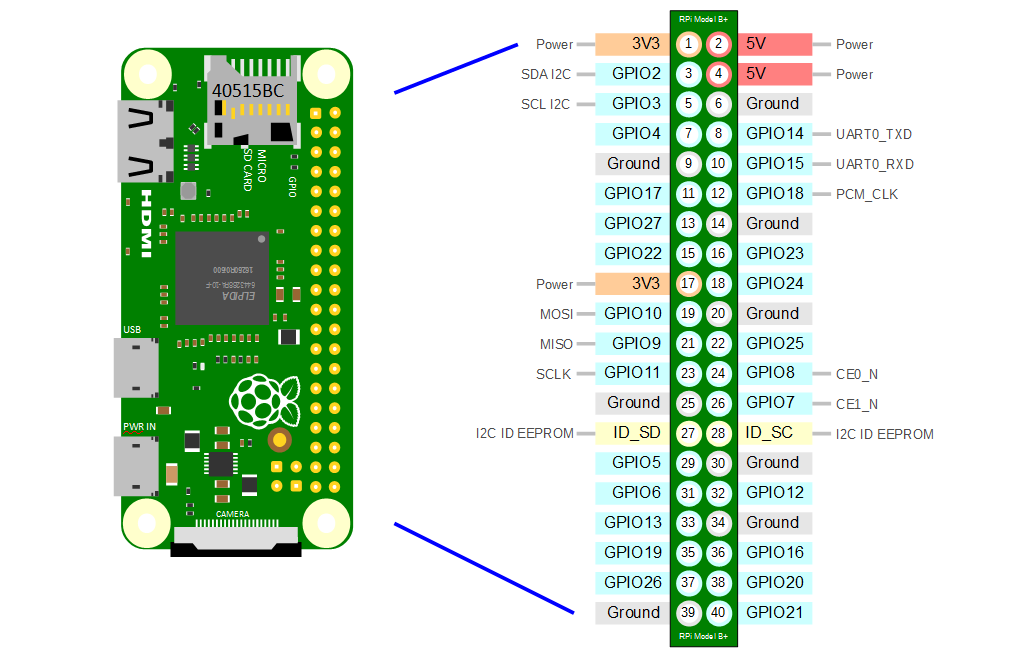You cannot select more than 25 topics
Topics must start with a letter or number, can include dashes ('-') and can be up to 35 characters long.
4.6 KiB
4.6 KiB
Introduction
This repository guides you to implement and use the HTU21D temperature and humidity sensor by using I2C communication. The repository contains the following files:
htu21d.hlibrary header fileshtu21d.cimplemenation methods filemain.can example file to test I2C communication using the libraryhtu21dexampleoutput file precompiled in a raspberry pi zero that returns temperature and humidity
Setup the raspberry
Enable I2C on the Raspberry Pi:
- Run sudo raspi-config.
- Navigate to Interfacing Options → I2C and enable it.
- Reboot the Pi.
Install I2C Tools and Development Libraries:
sudo apt-get update
sudo apt-get install i2c-tools libi2c-dev
Check if the sensor is detected:
sudo i2cdetect -y 1
This command should show an address for the HTU21D, typically 0x40.
0 1 2 3 4 5 6 7 8 9 a b c d e f
00: -- -- -- -- -- -- -- --
10: -- -- -- -- -- -- -- -- -- -- -- -- -- -- -- --
20: -- -- -- -- -- -- -- -- -- -- -- -- -- -- -- --
30: -- -- -- -- -- -- -- -- -- -- -- -- -- -- -- --
40: 40 -- -- -- -- -- -- -- -- -- -- -- -- -- -- --
50: -- -- -- -- -- -- -- -- -- -- -- -- -- -- -- --
60: -- -- -- -- -- -- -- -- -- -- -- -- -- -- -- --
70: -- -- -- -- -- -- -- --
My own header files for HTU21D sensor
This is a detailed guide to configure and create your own files to comunicate with each sensor used by the air-quality sensor.
Header
Create the Header File htu21d.h with Header Guard and Includes:
#ifndef HTU21D_H
#define HTU21D_H
// I2C Address
#define HTU21D_I2C_ADDR 0x40
// Commands
#define HTU21D_TEMP 0xE3
#define HTU21D_HUMID 0xE5
#define HTU21D_RESET 0xFE
// Function declarations:
// Temp
int getTemperature(int fd, double *temperature);
// Humidity
int getHumidity(int fd, double *humidity);
#endif // HTU21D_H
Implement the Sensor Communication htu21d.c
#include <unistd.h> //to send commands to and receive from I2C device
#include <sys/ioctl.h>//setting up and controlling the I2C device settings
#include <linux/i2c-dev.h>//definitions for system calls and structures specific to I2C
#include <i2c/smbus.h>//SMBus commands in a more standardized way for I2C
#include <stdio.h>//perror
#include "htu21d.h" // my own header file
// Reset function:
int reset(int fd)
{
if(0 > ioctl(fd, I2C_SLAVE, HTU21D_I2C_ADDR))
{
perror("Failed to open the bus");
return -1;
}
i2c_smbus_write_byte(fd, HTU21D_RESET);
return 0;
}
// Get temperature:
int getTemperature(int fd, double *temperature)
{
reset(fd);
char buf[3];
__s32 res = i2c_smbus_read_i2c_block_data(fd, HTU21D_TEMP,3,buf);
if(res<0)
{
perror("Failed to read from the device");
return -1;
}
*temperature = -46.85 + 175.72 * (buf[0]*256 + buf[1]) / 65536.0;
return 0;
}
// Get humidity:
int getHumidity(int fd, double *humidity)
{
reset(fd);
char buf[3];
__s32 res = i2c_smbus_read_i2c_block_data(fd, HTU21D_HUMID, 3, buf);
if(res<0)
{
perror("Failed to read from the device");
return -1;
}
*humidity = -6 + 125 * (buf[0]*256 + buf[1]) / 65536.0;
return 0;
}
Using the library
#include <stdio.h>
#include <errno.h>
#include <stdlib.h>
#include <string.h>
#include <fcntl.h>
#include "htu21d.h"
int main()
{
char filename[20];
snprintf(filename, 19, "/dev/i2c-%d", 1);
int fd = open(filename, O_RDWR);
if (0 > fd)
{
fprintf(stderr, "ERROR: Unable to access HTU21D sensor module: %s\n", strerror (errno));
exit(-1);
}
// Retrieve temperature and humidity
double temperature = 0;
double humidity = 0;
if ( (0 > getHumidity(fd, &humidity)) || (0 > getTemperature(fd, &temperature)) )
{
fprintf(stderr, "ERROR: HTU21D sensor module not found\n");
exit(-1);
}
// Print temperature and humidity on the screen
printf("HTU21D Sensor Module\n");
printf("%5.2fC\n", temperature);
printf("%5.2f%%rh\n", humidity);
return 0;
}
Compiling and testing
Then to properly compile whitout a make file:
gcc -o example main.c htu21d.c -li2c
or
gcc -o example main.c htu21d.c -I. -li2c
Wiring htu21d to Rasp-zero
Htu -> Rasp-Zero VIN -> GPIO 1 GND -> GPIO 9 or (6) SCL -> GPIO 5 SDA -> GPIO 3
